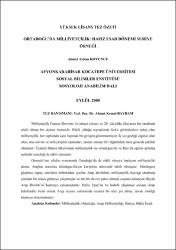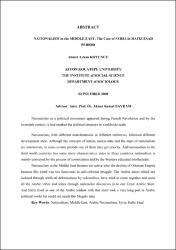| dc.contributor.advisor | Bayram, Ahmet Kemal | |
| dc.contributor.author | Koyuncu, Ahmet Ayhan | |
| dc.date.accessioned | 2015-03-11T12:01:56Z | |
| dc.date.available | 2015-03-11T12:01:56Z | |
| dc.date.issued | 2008 | |
| dc.date.submitted | 2008 | |
| dc.identifier.uri | http://hdl.handle.net/11630/2659 | |
| dc.description.abstract | Milliyetçilik Fransız Devrimi ile ortaya çıkmıs ve 20. yüzyılda dünyanın her tarafında
etkili olmus bir siyaset biçimidir. Etkili olduğu topraklarda farklı görünümlere sahip olan
milliyetçilik, her toplumda aynı biçimde bir gelisim göstermemistir. Đç içe geçtiği olgular olan
ulus, ulus-devlet ve milliyetçilik asamaları, zaman zaman biri diğerinden önce gelecek sekilde
olmustur. Üçüncü Dünya ülkelerinde milliyetçilik ise sömürgecilik ve Batı’da eğitim görmüs
aydınlar aracılığıyla etkili olmustur.
Osmanlı’nın yıkılısı sonrasında Ortadoğu’da da etkili olmaya baslayan milliyetçilik
akımı, Araplar arasında sömürgecilikten kurtulma sürecinde etkili olmustur. Sömürgeci
güçlerce yapay sınırlarla birbirinden ayrılan Arap devletleri, milliyetçilik bayrağı etrafında
yeniden bir araya gelmeye çalısmıslar ve tek bir devlet çatısı altında yasama amacıyla Büyük
Arap Devleti’ni kurmaya çalısmıslardır. Hafız Esad’da bu hedefe ulasmaya çalısan Arap
liderlerden birisi olarak Arap siyaset sahnesinde uzunca bir süre yer almıs, ancak istediği
basarıya ulasamamıstır | en_US |
| dc.description.abstract | Nationalism as a political movement appeared during French Revolution and by the
twentieth century, it had marked the political structure in worldwide scale.
Nationalism, with different manifestations in different territories, followed different
development style. Although the concepts of nation, nation-state and the steps of nationalism
are interwoven, in some certain periods one of them may get priority. And nationalism in the
third world countries has some more characteristics since in these countries nationalism is
mainly conveyed by the process of colonization and by the Western educated intellectuals.
Nationalism in the Middle East became too active after the decline of Ottoman Empire
because this trend was too functional in anti-colonial struggle. The Arabic states which are
isolated through artificial delimitations by colonialists, have tried to come together and unite
all the Arabic tribes and states through nationalist discourses in to one Great Arabic State.
And Hafız Esad as one of the Arabic leaders with that ideal took a very long part in Arabic
political world but could not reach this Megalo Idea. | en_US |
| dc.language.iso | tur | en_US |
| dc.publisher | Afyon Kocatepe Üniversitesi, Sosyal Bilimler Enstitüsü | en_US |
| dc.rights | info:eu-repo/semantics/openAccess | en_US |
| dc.subject | Milliyetçilik | en_US |
| dc.subject | Ortodoğu Arap Milliyetçiliği | en_US |
| dc.subject | Suriye | en_US |
| dc.subject | Hafız Esad | en_US |
| dc.title | Ortadoğu’da Milliyetçilik Hafız Esad Dönemi Suriye Örneği | en_US |
| dc.title.alternative | Nationalism in the Middle East: The Case Of Syria İn Hafiz Esad Period | en_US |
| dc.type | masterThesis | en_US |
| dc.department | Afyon Kocatepe Üniversitesi, Sosyal Bilimler Enstitüsü, Sosyoloji Anabilim Dalı | en_US |
| dc.authorid | TR59632 | en_US |
| dc.relation.publicationcategory | Tez | en_US |





















